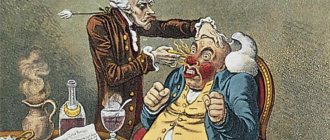To avoid having to quit smoking, it is better to never start. But what if you have started and have already been a smoker for a long time? I want to quit, but oh how difficult it is. You constantly promise yourself: “Only five cigarettes a day, that’s all.” Starting next month I will quit completely. I can, only a little later.”
It takes enormous willpower to quit smoking. But there is strength, but no will. And all these pills, patches, aerosols and grandmother’s conspiracies do not help. Because they act only on the physical level (if they act at all), and the point here is different - in the psyche or, as they say, in the brain.
To stop smoking you don’t just need to want to quit, you need to not want to smoke. Rebuild your thinking so that the bad habit no longer has any power over you. Ideally, the hand does not naturally reach for a cigarette pack, tobacco smoke causes disgust, and the thought “what a fool I used to be” is firmly rooted in the mind.
And if scientists have not yet come up with a magic pill for smoking, then why not try a method that doctors and psychotherapists have been using for their own purposes a long time ago? Hypnosis. On your own or with the help of a specialist, learn to think, feel in a new way and get rid of addiction forever.
Is it possible to quit smoking with hypnosis?
Let's start with the fact that only the Lord God can give a 100% guarantee of success. However, like everything else in our world. A positive result will occur if three conditions come together: the smoker’s desire to quit, his belief in success, and the hypnologist turns out to be an experienced specialist and not a charlatan.
Additionally, not all people are equally susceptible to hypnosis. Poorly amenable to hypnotic suggestion:
- emotionally cold people;
- people with profound mental retardation;
- patients suffering from complex mental illnesses.
For hypnosis to be effective, a person must understand what is happening to him. When someone who wants to quit smoking is under the influence of alcohol, drugs, or psychotropic drugs, there is no need to talk about achieving a positive result.
Why is it difficult to quit smoking
Cigarettes are often a psychological addiction. Alcohol actively disrupts the biochemical processes of the body; a person cannot stop drinking without physical suffering. Nicotine does not have such a strong effect on metabolism. The main problem is formed by the brain. Addicts think: “I like smoking, I can quit at any time, as soon as I’m ready.” No progress.
Hypnosis for smoking is often considered a panacea. Many people listen to reviews from people who have overcome a bad habit through hypnotherapy. True, after the treatment session there is a lot of work to be done - this is on the patient’s conscience.
The cigarette is tightly fused with all the life processes of the smoker. In the morning I got up, smoked, before getting into the car I smoked, after lunch I smoked, in the evening I had a glass of wine - a sacred thing. The cigarette becomes a constant factor organizing life. For this reason, when an addict is in the process of quitting, it becomes difficult for him to live. Habitual rituals are changing; even holding a cigarette in your hands is a habit; your hands will constantly lack something.
The patient thinks that by trusting hypnosis against smoking, he will immediately forget about cigarettes. Hypnosis treatment for tobacco smoking can indeed eliminate physical cravings for nicotine, but there is a psychological component.
Numerous reviews of those who have experienced the effects of hypnosis from smoking say that you need to skillfully sublimate the absence of a bad habit. Many people begin to eat heavily, which is why they gain weight after they stop being smokers. The right thing to do is to find a favorite activity to get rid of discomfort even in your thoughts. This could be buying a pool membership or running regularly in the morning.
Mechanism of hypnotic influence
Do you know the state between sleep and reality? The body is relaxed, the brain is open, you seem to still feel reality, but you are ready to plunge into the arms of Morpheus. We are in such half-asleep every day when we go to the side. It is in this state that a person becomes susceptible and suggestible on a subconscious level. This is the main essence of hypnotic influence. The specialist, using his voice, gradually puts the person into a trance. At the same time, some areas of the brain respond successfully in real life - the person hears the voice of the hypnologist, follows his commands, and answers the questions posed.
The session begins with the first stage of hypnotic sleep, during which physical sensitivity and reaction to what is happening around is maintained. It seems to a person that thoughts, sounds, and time slow down. I hear everything, but I’m reluctant to react - for most it looks something like this. For some, the first stage is enough to quit smoking. Others have to be plunged into the deeper depths of the subconscious. It all depends on the suggestibility of a person.
Why can’t one instill an aversion to smoking in a normal state without putting a person into a trance? You can try. Some even try. Only a few perceive this. The human psyche is a cunning and flexible thing. They paint scary pictures on cigarette packs, and they constantly broadcast on television about the dangers of tobacco. And what? Almost nothing. The smoker's consciousness will find a way not to perceive or circumvent the information received. Something like – this doesn’t apply to me, or – I’ll think about it later.
Consequences of nicotine addiction
Nicotine addiction develops after a couple of weeks of use, and in some people after a few days. Quitting smoking causes a strong withdrawal syndrome, which is characterized by the following symptoms:
- dizziness, headache;
- nervousness, irritability, anxiety;
- mood swings;
- heaviness in the chest;
- lack of coordination;
- dry mouth;
- irritating cough;
- decreased attention.
Withdrawal begins a few hours after smoking a cigarette. The acute stage continues throughout the day and reaches its peak 24-48 hours after discontinuation. Over time, the symptoms weaken and completely disappear after a few weeks.
Those who quit smoking report weight gain. This is due to the habit of keeping your mouth busy. Former smokers constantly eat seeds, nuts or candies. To prevent weight gain, it is enough to adjust your daily routine and add physical activity, for example, walking at a brisk pace.
Unlike an alcoholic or drug addict, a smoker does not lose his moral character with the development of an addiction to cigarettes. However, in terms of the degree of destructive influence, tobacco smoke is worse than heroin. It contains over 200 dangerous toxic substances.
Nicotine speeds up the burning of calories and increases metabolism, which is why smokers are lighter. The substance increases the secretion of gastric juice, which leads to peptic ulcers. Nicotine disrupts adrenal function and causes hormonal imbalance. Smoking in childhood and adolescence inhibits sexual development and leads to infertility.
When a cigarette burns, carbon monoxide is released. It has a direct effect on hemoglobin synthesis and changes its composition. As a result, the oxygen supply to the body is disrupted. The brain suffers the most from this. With regular hypoxia, its cells die, which leads to a stroke. Carbon monoxide increases blood viscosity and the risk of blood clots. Smoking destroys the walls of blood vessels and causes heart pathologies.
In addition to nicotine, tobacco contains carcinogens. These are harmful substances that stimulate the growth of tumor cells. The smoker's lungs are the first to be affected. This is an organ that regenerates very slowly. First, inflammation of the respiratory tract develops, then the alveoli die. Obstructive pulmonary disease occurs. Over time, healthy cells change their structure and cancer develops. In 90% of cases, the cause of lung cancer is smoking. Tobacco smoke also affects the larynx, nasopharynx, and trachea.
Smoking during pregnancy leads to oxygen starvation at the cellular level. As a result, the formation of fetal organs and tissues is disrupted. Women who smoke during pregnancy are several times more likely to have a child with mental disabilities. When nicotine is consumed, chronic hypoxia develops, which can lead to fetal death.
Most smokers are convinced that they can quit the bad habit at any time. In practice, people addicted to nicotine can give up their addiction for a short period of time, then a relapse inevitably occurs. Smokers cannot tolerate withdrawal symptoms, so they return to cigarettes.
Nicotine addiction is eliminated faster and easier than alcohol and drug addiction. Treatment of tobacco smoking has a favorable prognosis. A few months of therapy are enough to achieve stable remission. A person must realize that nicotine addiction is a disease that requires immediate treatment. If you consult a doctor in a timely manner, you can get rid of it quickly and without consequences.
For a while or forever
Will hypnosis help you quit smoking forever? If you want, yes, it will help. If you really want to, you can refuse it yourself. Replace the pleasure you get during smoking breaks with something more pleasant and less harmful. The main thing is to keep your hands and brains busy with something all the time. Because the greatest desire to smoke occurs when a person is nervous or when he has nothing to do.
Unfortunately, there are no comprehensive statistics on this issue. It's a pity. It would be interesting to know which method helps and how much: how many people completely quit smoking, who couldn’t resist and started again, and what percentage of the total number of those who applied was not affected by hypnosis at all. In reality, you have to rely on reviews from smokers, advertising, or the experiences of friends.
Hypnosis against smoking: types, methods, techniques
People are all different. Some are 100% visual, while others perceive and process most information through hearing. For one smoker, one or two sessions of hypnosis are enough, and he will never smoke again. The subconscious of the other will resist to the last, and the psychotherapist-hypnotist will need several months to understand and eliminate the cause of the addiction.
If we consider the problem, there are not so many ways to influence smokers. Most techniques are based on strong emotions - fear or disgust. They work effectively for some people, which means they have a right to exist. This is a kind of coding against addiction.
Individual or group sessions with a hypnotherapist are often based on a different principle. While the smoker “floats in nirvana,” the hypnologist finds out the causes of addiction and forms a different attitude towards tobacco. The place of the association “smoking - relaxing” is taken by another - “cigarette is evil”.
Will hypnosis help you quit smoking?
Quitting smoking with hypnosis is possible. A small correction - if a competent specialist takes over for you. During a hypnosis session, a heavy smoker receives suggestion at the level of consciousness. The patient is put into a trance state, and a new attitude towards nicotine is imposed on him.
The psychotherapist does this by changing associations to smoking. The result is this: a person associates smoking with a relaxing effect, and then a persistent negative feeling arises. A smoking hypnosis session operates at the level of consciousness.
Anti-smoking hypnosis provides effective results with the help of special anti-addiction encodings. You can quit smoking under hypnosis in one session, which lasts no more than one hour. This depends on the patient’s individual hypnotizability and the technique used.
Hypnosis techniques against smoking: which is better
It is difficult to decide for someone what is better. Everyone should choose a method according to themselves, their character and ability to communicate with people.
The basis of success is the trust of the person who wants to quit smoking in the psychotherapist or his method. If trust does not arise, the venture is doomed to failure!
Audio hypnosis - listening to a recording at home. The method does not involve personal contact with the hypnotherapist. Suitable for people who have little free time or who for some reason do not want to be alone with a hypnotist. The person chooses the right time for himself, turns on the recordings and plunges into a light trance. The session lasts 30-40 minutes.
The effectiveness of this method is influenced by the hypnotist’s voice, intonation, and timbre.
has a more severe effect on the conscious and subconscious mind . It's like a horror movie, only worse. Because it demonstrates reality. The videos show what catastrophic consequences nicotine addiction can lead to.
For impressionable women with weak psyches and problems with the cardiovascular system, it is better to choose a different method of getting rid of addiction.
Fast victory
After holding on for a couple of days, a week or a month, a person may decide that he has already coped with addiction, because the main withdrawal symptoms have already passed. This is a dangerous misconception. Under its influence, a former smoker may start smoking again: many decide to test themselves in this way or believe that one cigarette will not do any harm. In other cases, the feeling of a quick victory is dangerous due to subsequent disappointment. With nicotine addiction, withdrawal symptoms persist for three months. At this time, irritability and uncertainty may occur, a person may feel depressed, and gain weight. If dissatisfaction with these manifestations continues to accumulate, the former smoker may return to smoking simply because he does not see changes for the better.
Methods that work for results
There are many methods of hypnosis against smoking, in contrast to methods of influencing the subconscious. Most of them are based on audio hypnosis. The smoker is offered to listen to messages in various variations and with different frequency, which help to develop a negative attitude towards smoking.
Method of psychotherapist Victor Guzhagin
It was developed by a psychiatrist with extensive medical practice.
The method consists of two courses of 14 days each, with a week's break between them. There are sixteen audio lectures to listen to. On the first and last day of the course, there are two lectures at once. Entries must be placed in the order recommended by the author.
The technique does not work instantly. But, despite this (or maybe because of this), the method has proven itself well.
Suggestion and self-hypnosis of the physiologist Shichko
A simple method, but still showing results. A person’s attention is correctly focused on the fact that he has a problem, which he has denied for a long period. Next, the smoker is asked to mentally return to the past, remember and analyze the actions with the cigarette. That is, how it was and how it could be.
The basis of the method is the mandatory keeping of a diary for at least six months. In the evening, a person describes the events of the past day, looks at himself from the outside and gradually removes the bad habit program. During the recovery process, he is led “by the hand” by an instructor who tries to prevent a possible breakdown.
Quitting smoking according to Paul McKenna
The English hypnotherapist prefers to act by persuasion. His system helps get rid of the fear of living without smoking. It will be strange for people who have managed to avoid the addiction to hear that most smokers are afraid of life without cigarettes. They are convinced that it will be impossible to fully relax without nicotine.
In his method, McKenna evokes positive emotional memories from patients' lives before smoking. During a hypnotic session, he pulls them to the surface of consciousness and makes them the basis of the desire to give up the bad habit.
There is no plan or it is wrong
If a person quits smoking spontaneously, without a plan, he also runs the risk of spontaneously returning to smoking. Treatment of tobacco addiction must be planned: it is important to determine motivation, adjust lifestyle, set deadlines for quitting cigarettes, decide what support measures will be used (substitution therapy, psychotherapy and others). The most common mistake in planning is trying to quit smoking by reducing the number of cigarettes. Nicotine addiction “requires” a constant increase in dose (as with any other drug). Trying to smoke less, a person only prolongs the abstinence period and intensifies it. At the same time, it perpetuates addiction, because the cigarette begins to be perceived as a “reward” for several hours of abstinence. The wrong plan can cause disappointment and breakdown if a person expects results too quickly: for example, that the craving for cigarettes will disappear in a few days or shortness of breath will disappear in a month. Positive changes are usually invisible and difficult to evaluate.
When quitting smoking, it is important to have motivation for this: to understand that quitting smoking is necessary to improve your health and reduce the risk of dangerous diseases. Nicotine addiction is almost always caused by psychological factors: people perceive smoking as part of their lifestyle, their personality, as a way to cope with stress or work more productively. In such cases, treatment with substitution methods (tablets, chewing gum, patches) must be supplemented with psychotherapy. Medical narcologists note that when quitting smoking, it is important to carefully monitor your well-being. If dizziness, nausea, insomnia, or blood pressure disorders occur, you should consult a doctor and try to quickly restore your normal state of health.
Have questions? Get a free specialist consultation by phone:
+7
Indications and contraindications for hypnosis
As mentioned above, treatment of smoking with hypnotherapy is contraindicated for people with severe mental retardation and serious mental illness. Firstly, they will not understand the messages sent in their direction, and secondly, due to their characteristics, they will not be able to follow the instructions of the hypnologist.
Hypnosis sessions cannot be conducted for people under the influence of alcohol, psychotropic drugs, or drugs. Experts know this. People who are trying to quit smoking on their own need to remember this.
A tendency to hysterics, depression, and panic attacks is a contraindication to watching videos of hypnosis sessions.
In other cases, hypnotherapy will only bring benefits. By influencing the underlying problem, hypnosis has a positive effect on the entire body as a whole. Neuroses disappear, sleep quality improves, headaches go away, the heart begins to function better, and blood pressure normalizes. All this is possible if the sessions are conducted by a good hypnologist.
Benefits of hypnotherapy for smokers
- no side effects;
- drug influence is excluded;
- sustainability of the positive effect;
- There are no psychological or physical withdrawal symptoms.
Hypnotherapy sessions are healing. They have a positive effect on the functioning of the body. The cardiovascular, digestive, and respiratory systems begin to function better. Withdrawal symptoms due to quitting tobacco are eliminated. A hypnologist deals with irritability and insomnia. Anxiety and migraines go away.
An independent attempt to break a bad habit results in outbursts of aggression and depression. The period of struggle with nicotine drags on, failures and breakdowns lead to disappointment. Psychological constriction appears and an inferiority complex develops. The smoker comes to the conclusion that it is impossible to break free from nicotine addiction. Psychotherapeutic settings help to go through the difficult stages of abandonment gently and without consequences.
Smoking is considered a less harmful habit in people's minds than alcohol or drug abuse. Naturally, when a person smokes, he does not exhibit inappropriate, aggressive behavior. But the harm done to the body is no less. In European countries, and now in Russia, the method of quitting smoking using hypnosis is widely used. Absolutely safe and harmless technology. The main thing is that no preparation is required from the client, other than a strong desire to get rid of nicotine. In this case, success is guaranteed.
What people say
The opinions of people who have experienced hypnotic influence in the struggle for a healthy lifestyle are very contradictory. It helped some, some are still in the process of recovery. There are also those who did not feel the positive effect.
Here is a small selection of objective (and sometimes subjective) reviews.
Galina
For the last 33 years I haven’t let go of a cigarette. In my youth I smoked Prima and Astra, then switched to filter cigarettes. I started looking for a way out of the situation when my body started to fail. But still I couldn’t get less than a pack a day. I attended several audio hypnosis courses. And she did this when she most wanted to smoke. I didn't quit completely. But now I only take up a cigarette after eating. Enough 3-4 pieces per day.
Victor
Your hypnosis is pumping out money. If I want to quit, I'll quit myself. I haven’t tried it, I won’t try it and I won’t recommend it to my friends.
Evgeniya
I really want to quit, but I can’t yet. As soon as I start to freak out, my hand reaches for the pack. I tried not to buy it, but I’ll still go and ask my neighbors. The video course didn’t help, or rather, I almost didn’t watch it. It became disgusting, scary and turned off. But I want to quit. Maybe someone can recommend a normal hypnologist to really help. And not too expensive.
Kate
But it helped me, although maybe I’m suggestible. I listened to the recordings before bed for two weeks. In the end I even fell asleep without finishing listening. I have had no desire to smoke for over a year now.
Andrey
I am in favor of working directly with a hypnotist. You can immediately see who is helping and who is not. We had five people at the sessions. Let's call back now. Four of us in our group no longer smoke. And the fifth one periodically breaks down.
As you can see, the opinions are completely different. Based on the reviews, we can conclude that two components are important - desire and a good specialist. Another question is where to find such a specialist.
How to distinguish professionals from charlatans
Fraudsters are found everywhere, in all areas of our lives. It’s especially offensive when they act under someone else’s guise and discredit really good things, services, methods.
How do our people usually look for a good hypnotist? Type “hypnotherapist” and the name of the locality into the search bar. And then they act according to the template - they scan the first 4-5 sentences and choose what they like best. The price of services often plays a role - the desire to save money is in the blood of our people.
What's next? Then the lottery begins - lucky/unlucky. You can do it this way too. No one has ever canceled their luck. But, having run into scammers, you will only have to complain about yourself.
You can find a professional, respectable hypnotherapist on the Internet if you learn a few simple truths:
- Only doctors and psychologists have the right to conduct hypnotherapy sessions. In order to instill the right messages in a patient, they, at a minimum, need to have knowledge about the workings of the human psyche. You can’t learn this at home, on the couch. Therefore, a hypnologist must have a document on special education.
- It is advisable to focus not only on reviews published on the Internet, but also on the opinions of familiar doctors. They usually have extensive connections, and recommending a good specialist will not be difficult for them.
- You can go to a thematic group “quitting smoking”. Just not at once. Chat there for a few days and you will learn a lot of useful information.
- Go to the hypnotherapist's website. It’s good if there are feature articles, videos, photographs.
- If you live in the same city, visit the hypnotist in person. Make an appointment in advance by telephone. The person should be pleasant to you on an energetic level. During the communication process, it is not difficult to understand whether this specialist can solve your problem or whether you need to continue searching.
You need to quit smoking. If you can’t do it yourself, then why not use the services of a hypnotherapist? There is no need to be afraid of them. No one is going to turn you into a zombie, find out your secrets and control your actions while you are in a trance state. Most hypnologists are good specialists who really help people. All that remains is to correctly configure the filters and filter out unwanted elements.
Causes and signs of nicotine addiction
The number of people who smoke in the world exceeds 1 billion. About 50% of them are children and teenagers.
The main reasons for smoking at an early age are the desire to imitate elders, appear more mature and not look like a black sheep in the company of friends. In the first few days of use, nicotine causes nausea, headache, and dizziness. About 6% of people quit smoking at this stage due to discomfort. Over time, they disappear, and nicotine addiction occurs. For its development, 1-2 weeks of use are enough.
Nicotine enters the bloodstream within seconds of administration and acts faster than an intravenous drug. The substance stimulates the production of dopamine, endorphin and the release of adrenaline. As a result, the smoker feels euphoria and high spirits. Over time, cigarettes become a method of coping with stressful situations.
The main reasons for smoking are:
- need for psychological stimulation. Nicotine increases brain activity in the short term, which is why smoking is common among students and those with mentally stressful jobs;
- substitution Nicotine suppresses appetite, which is why some people smoke to avoid feeling hungry. Flavored cigarettes with flavoring additives also stimulate passion for the smoking process;
- difficulty in communication. Smoking during a break at work helps to relax and improve relationships with colleagues;
- stressful situation. Nicotine provides short-term calm and improves mood;
- smoking environment. Constant passive smoking stimulates the desire to try;
- Aesthetic pleasure. Many people are sure that smoking is beautiful. As a rule, they rarely do this for demonstrative purposes;
- imitation. In families where parents smoke, the likelihood of nicotine addiction in children is several times higher;
- alcohol consumption. Alcohol stimulates nicotine hunger and increases the desire to smoke several times;
- the need to calm down. This habit comes from childhood. Just as a child calms down with a pacifier in his mouth, a smoker stops worrying with a cigarette. A person gets pleasure and peace from the process itself, and not from the effects of nicotine on the body.
A person who smokes has a characteristic bad breath and darkened skin on the fingers with which he holds a cigarette. Over time, a smoker's teeth turn yellow and decay. Constant shortness of breath and tachycardia appear. A person suffocates when climbing to the second floor or when walking quickly.
In most cases, nicotine addiction can be avoided by simply refusing the cigarette offered. Health is more valuable than the respect of dubious acquaintances. It is easier to prevent any disease than to treat it. According to statistics, only 4-6% of smokers quit the bad habit on their own. In other cases, the help of a doctor and special treatment are required.











